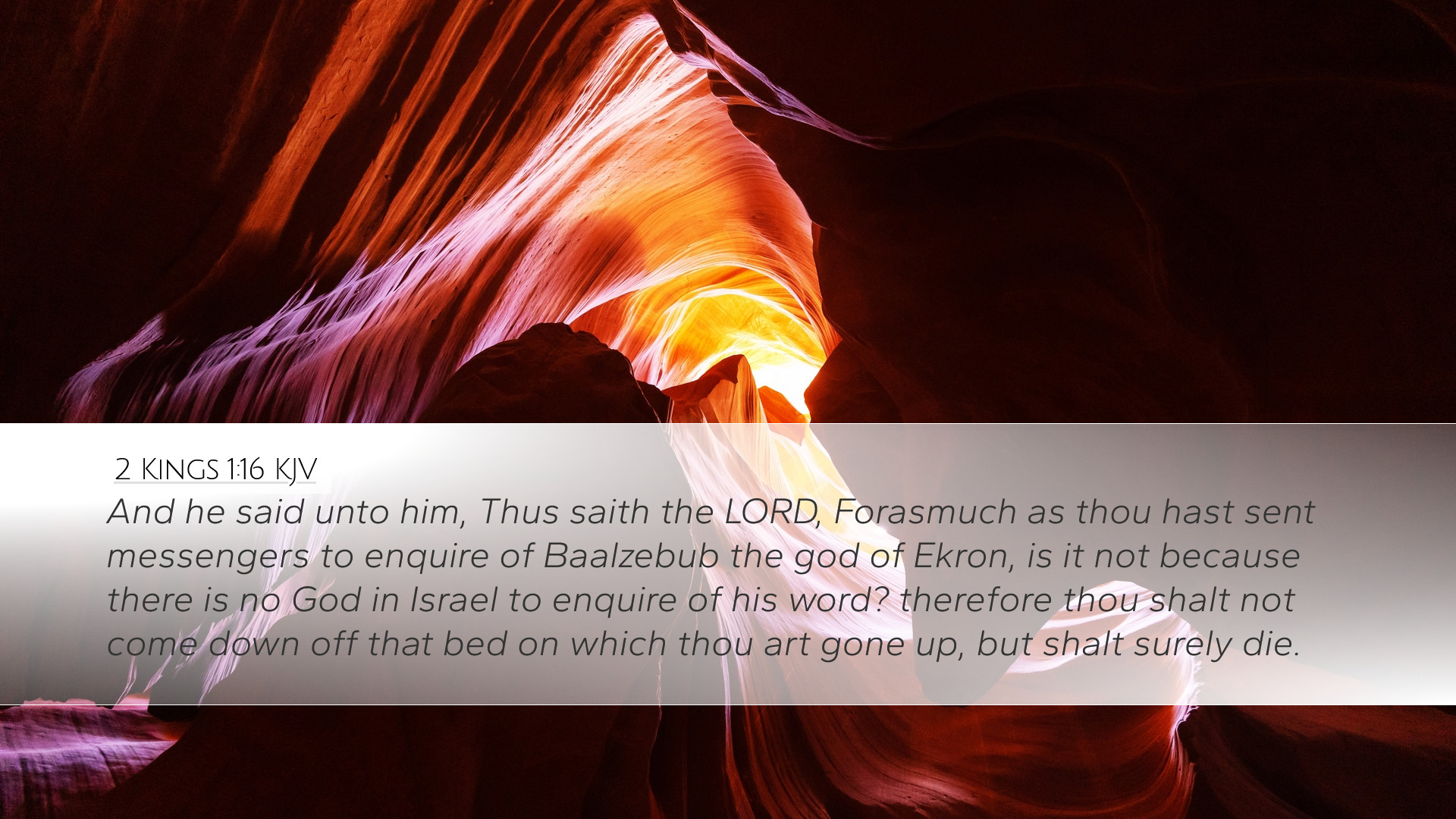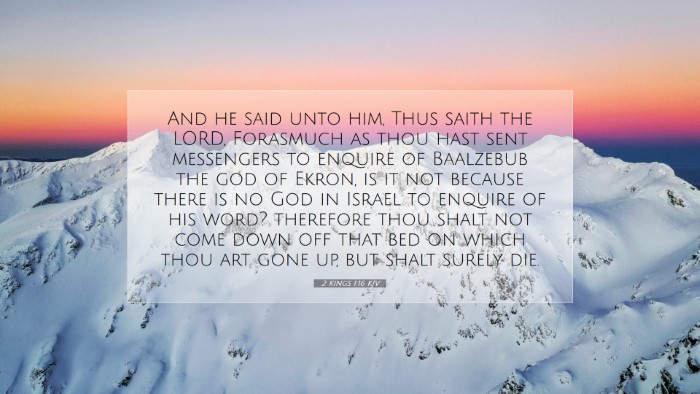Old Testament
Genesis Exodus Leviticus Numbers Deuteronomy Joshua Judges Ruth 1 Samuel 2 Samuel 1 Kings 2 Kings 1 Chronicles 2 Chronicles Ezra Nehemiah Esther Job Psalms Proverbs Ecclesiastes Song of Solomon Isaiah Jeremiah Lamentations Ezekiel Daniel Hosea Joel Amos Obadiah Jonah Micah Nahum Habakkuk Zephaniah Haggai Zechariah Malachi2 Kings 1:16
2 Kings 1:16 KJV
And he said unto him, Thus saith the LORD, Forasmuch as thou hast sent messengers to enquire of Baalzebub the god of Ekron, is it not because there is no God in Israel to enquire of his word? therefore thou shalt not come down off that bed on which thou art gone up, but shalt surely die.
2 Kings 1:16 Bible Commentary
Commentary on 2 Kings 1:16
Bible Verse: "And he said unto him, Thus saith the LORD, Forasmuch as thou hast sent messengers to inquire of Baal-zebub the god of Ekron; is it not because there is no God in Israel to inquire of his word? therefore thou shalt not come down from that bed on which thou art gone up, but shalt surely die." (2 Kings 1:16, KJV)
Introduction
The verse at hand marks a significant moment in the narrative of 2 Kings. This instance demonstrates the confrontation between Yahweh and the idolatrous practices of Israel under King Ahaziah. The prophet Elijah, representing the one true God, delivers a strong rebuke through divine revelation, emphasizing the folly of seeking guidance from a false god.
Contextual Analysis
Understanding the context of this verse is crucial for grasping its theological implications. King Ahaziah's reign in Israel was characterized by a departure from the worship of Yahweh. Following an injury, he sought counsel from Baal-zebub, the god of Ekron, instead of turning to the Lord. In this pursuit, Ahaziah demonstrated a profound spiritual decline that echoed through the history of Israel, showcasing a pattern of rebellion and idolatry.
- Historical Background: Ahaziah, the son of Ahab, continued in the idolatrous footsteps of his parents. His allegiance to Baal worship reflected a broader national tragedy, where the rightful worship of Yahweh was consistently undermined.
- Geographical Significance: Ekron was one of the five Philistine cities, a place associated with the worship of pagan deities. This reflects the extent of Israel's spiritual vacillation and moral corruption.
Theological Themes
The passage brings forth several important theological themes:
- Divine Authority: The message from the Lord through Elijah underscores God's sovereign authority over life and death, reinforcing the narrative that no other god has the power to heal or direct human affairs.
- Idolatry and Its Consequences: Ahaziah’s decision to consult Baal-zebub is a commentary on the consequences of turning away from God. This serves as a warning to all who would prioritize worldly wisdom over divine guidance.
- Revelation of God's Judgment: The judgment pronounced upon Ahaziah emphasizes the seriousness with which God views idolatry and the rejection of His counsel.
Insights from Prominent Commentators
Matthew Henry
In his commentary, Matthew Henry emphasizes that God's words through Elijah served to illustrate His disapproval of the idolatry prevalent in Israel. He points out that the questioning of God's existence as an option reflects humanity's spiritual blindness.
- The Rejection of God: Henry details how Ahaziah’s actions revealed a fundamental rejection of Yahweh. He notes that it was not simply a search for knowledge but a deep-seated aversion to divine authority.
- Prophetic Authority: The bold declaration of judgment by Elijah exemplifies the unwavering confidence of God's prophets, who fearlessly relay God’s messages despite potential repercussions.
Albert Barnes
Albert Barnes adds an insightful layer regarding the significance of inquiring of Baal-zebub. He explains that this act was not just a religious inquiry but a blatant act of apostasy against the covenant established with Israel.
- God's Character: Barnes highlights God’s nature as one who deserves the exclusive loyalty of His people, implying that turning to other gods not only violates the first commandment but also degrades the notion of God’s providence.
- The Irony of Baal-zebub: The very god Ahaziah sought, Baal-zebub, whose name means "lord of the flies," emphasizes the worthlessness and impotence of idols compared to the living God.
Adam Clarke
Adam Clarke offers a detailed consideration of the nature of Ahaziah’s ailment and the significance of his inquiry. He argues that inquiring about Baal-zebub instead of seeking the God of Israel displayed an utter denial of God's omnipotence and healing ability.
- Futility of Idolatry: Clarke elaborates on the futility of seeking answers from false gods, reflecting a worldview that does not recognize God's power and wisdom.
- Judgment Portrayed: Clarke notes that the judgment upon Ahaziah serves as a reminder and a foreshadowing for future leaders of Israel, confirming that God will not tolerate the abandonment of worship in favor of false deities.
Application for Believers
This passage challenges contemporary believers to consider where they seek guidance and wisdom. In a world rife with distractions and competing philosophies, the call remains the same: to inquire of the Lord and trust in His provision.
- The Importance of Seeking God: Just as Ahaziah sought counsel from an idol, today believers must guard against the myriad of alternatives that vie for their attention and loyalty.
- Recognizing the Authority of Scripture: The weight of God's Word should compel believers to prioritize spiritual truth over worldly philosophies.
- Trust in God’s Sovereignty: The narrative reminds Christians that even in times of crisis, seeking God should be the foremost action rather than resorting to secular or idolatrous means.
Conclusion
The verse from 2 Kings 1:16 encapsulates the enduring struggle between fidelity to God and the temptation of idolatry. The insights from historical commentary reveal the depths of spiritual blindness that can envelop individuals and nations alike. As stewards of God’s Word, it is vital for pastors, students, theologians, and Bible scholars to remind their communities of the unwavering nature of God and the grave seriousness of spiritual fidelity. May believers continue to turn to the living God in all matters of life, recognizing the futility of the alternatives offered by a world enamored with idols.


